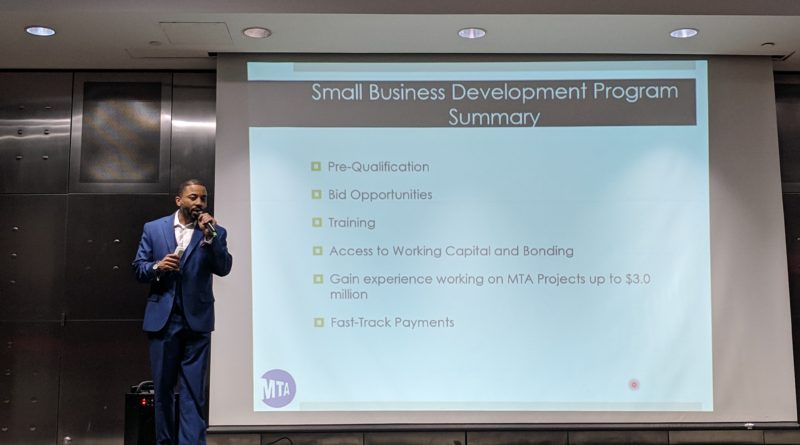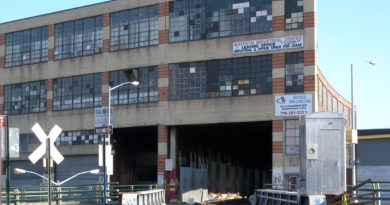MTA has more projects than capable contractors
Encouraging businesses to qualify to bid on project
Construction firms looking to grow their small businesses and become prime contractors have a great opportunity by being involved in the city’s vast transportation market, which has more available projects than current bidders.
For the past decade, the MTA’s Small Business Mentoring Program (SBMP) has helped businesses expand. On March 26 at the Queens Chamber of Commerce headquarters in Jackson Heights, SBMP manager Nadir Jones explained how subcontractors can become prime contractors by working with the MTA.
If a firm is qualified to participate in SBMP, it will undergo an improvement plan assessment session before being invited to bid on MTA construction projects.
“We’re giving our contractors the opportunity to control their own destiny and move out of the subcontractor space,” said Jones.
SBMP provides a framework to facilitate small business growth, which is broken into two tiers: a Tier 1 Mentorship and a Tier 2 Graduate Mentorship. There also is a Small Business Federal Program for federally funded projects.
Tier 1 has a four-year duration once a firm is approved for the program. Firms are assigned a project manager from TDX Construction, one of the largest construction management firms in the industry. The project manager is brought on board to assist the project and ensure a timely and on-budget completion.
In Tier 1, contractors have the opportunity to bid up to $1 million on prime construction contracts for the MTA. After four years, firms can graduate to Tier 2, where firms can bid on project values up to $3 million.
To qualify for Tier 1, a firm’s average three-year revenue cannot exceed $3 million, and the principal owner’s net worth cannot be greater than $3.5 million.
Contractors are provided with access to loans up to $150,000 per contract, one-on-one mentoring, free 13-course training classes, free business plan development, and waived bonding.
Tier 2 qualification is contingent on the successful completion of a Tier 1 mentorship. The maximum average three-year revenue is $5 million and the owner’s net worth is capped at $3.5 million.
Firms are provided the same assistance as Tier 1, but the loan value increases to $900,000 per project, and firms must obtain a surety bond, facilitated through the MTA Internal Bond Program.
The Small Business Federal Program (SBFP) shares practically all benefits and qualifications as SBMP Tier 2, with the primary difference being the source of the project’s funding. All SBMP projects are state funded, whereas SBFP projects are federally funded.
Additionally, if a firm’s average three-year revenue exceeds the $3 million maximum requirement of Tier 1, it might be eligible to enter straight into SBFP.
SBMP provides fast-track assistance by paying all their contractors within 10 business days, awarding their projects within 22 business days, and having closeouts occur within 20 to 30 business days.
While there are many benefits for contractors in the program, something noticeably absent is the number of contractors participating. As of April 17, 2018, there are only 165 prequalified firms in Tier 1, 36 in Tier 2, and 22 in SBFP. This has led to SBMP having to outsource jobs.
“I actually have more work in the program than I actually have contractors bidding,” said Jones, before explaining how he had to give $60 million of work to the MTA two years ago. “I’m not giving back another $60 million, so that’s why we’re here.”
Among the projects spread over five different agencies, including New York City Transit, Long Island Railroad, and Metro North Railroad, the MTA is recruiting firms to renovate buildings, staircases, stations, kiosks, and bus lifts, to name a few of the projects.
SBMP especially encourages Minority and Women-Owned Business Enterprises (MWBE), Disadvantaged Business Enterprises (DBE), and Service-Disabled Veteran-Owned Small Businesses (SDVOB) to apply.
“Historically, these groups don’t have the capacity to build that type of work all from jump, so this is the reason why we developed this program,” Jones stated, “to be a little bit more inclusive of how we spend taxpayers’ money.”
For information on how to apply, call the SBMP Prequalification Unit at (212) 878-4757 or email [email protected].
By Salvatore Isola | [email protected]




